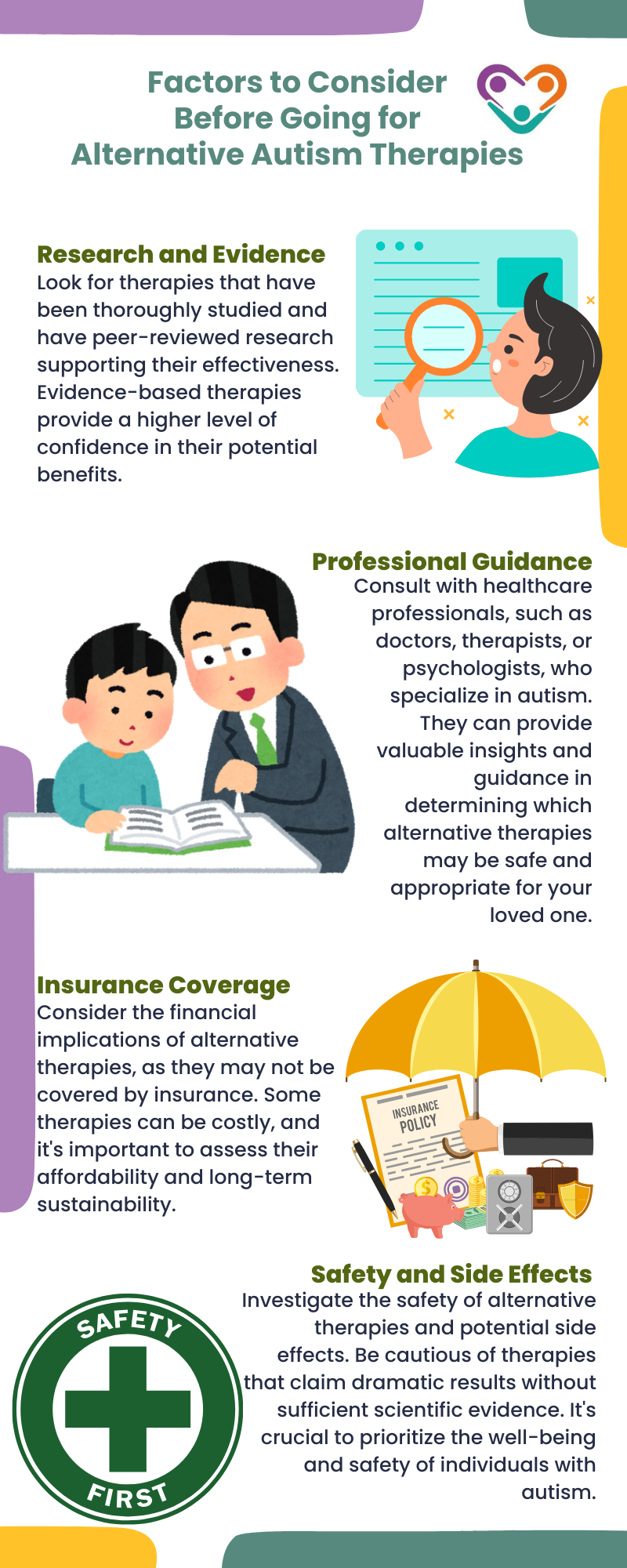There are various options available to help individuals with autism thrive and reach their full potential. These therapies aim to address specific challenges associated with autism spectrum disorder (ASD) and support individuals in their development and daily functioning.
But which one exactly is the best therapy for autism? Let’s find out.

Behavioral Therapies
As far as autism therapy goes, behavioral interventions play a crucial role in helping individuals with autism develop important skills and behaviors. There are two commonly used behavioral therapies in this case which are as follows:
Applied Behavioral Analysis (ABA)
Applied Behavioral Analysis (ABA) is widely regarded as the “gold standard” of autism-specific treatment. It focuses on teaching skills and behaviors that are essential for success in various environments, such as school or work.
ABA therapy involves immersive treatment, where a therapist, along with the parent, provides continuous language and behavioral cues throughout the day.
The primary goal of ABA therapy is to help individuals with autism improve their communication skills, social interactions, and daily living skills. It utilizes positive reinforcement techniques to encourage desired behaviors while minimizing challenging behaviors. The therapy is highly individualized and tailored to meet each person’s specific needs and goals.
It’s worth noting that insurance companies are increasingly recognizing the effectiveness of ABA therapy and are starting to reimburse for its services.
Additionally, Medicaid can cover several hours of ABA therapy each week, making it more accessible to families seeking this type of intervention for their child with autism.
Developmental Therapies
Developmental therapies also play an important role in the treatment of autism. These therapies focus on helping autistic children build emotional skills, enhance relationships, expand abstract thinking, and foster bonding with others.
While behavioral therapies primarily target skills and behaviors, developmental therapies aim to promote emotional growth and enhance social interactions.
Developmental therapies may include various approaches, such as play therapy, social skills training, and cognitive behavioral therapy. These interventions provide a supportive and structured environment where children can learn and practice important social and emotional skills.
By combining behavioral therapies like ABA with developmental therapies, individuals with autism can benefit from a comprehensive approach that addresses a wide range of their needs.
It’s important for parents and caregivers to work closely with professionals to determine the most appropriate therapy options for their loved ones with autism.

Speech and Language Therapies
Apart from behavioral therapies, there are also speech and language therapies which play a crucial role in helping individuals with autism improve their communication skills and interact effectively with others.
Let’s look at the two key components of speech and language therapies for autism.
Speech Therapy
Speech therapy is a central part of treatment for autism, focusing on helping individuals with autism develop their speaking and communication abilities. Speech therapists, also known as speech-language pathologists (SLPs), work closely with individuals with autism to address a range of communication challenges.
In speech therapy, SLPs assist individuals with autism in acquiring spoken words, improving articulation, and developing appropriate prosody, body language, and humor recognition.
The therapy sessions can also involve working on nonverbal communication skills, such as making eye contact, taking turns in a conversation, and understanding and using gestures.
For individuals with more severe communication difficulties, speech therapy may involve alternative forms of communication, such as picture symbols, sign language, or the use of computers or assistive devices.
The goal is to help individuals with autism effectively express themselves and understand and respond to others in various social contexts.
Communication Skills Development
Communication skills development is another vital aspect of speech and language therapies for autism. These therapies focus on improving the overall communication abilities of individuals with autism, going beyond just speech production.
In communication skills development, SLPs work with individuals with autism to enhance their ability to use and understand language, both verbally and nonverbally.
This includes teaching skills such as following directions, answering questions, initiating and maintaining conversations, and using appropriate social language in different situations.
The therapy sessions may involve various techniques and strategies tailored to the individual’s needs, such as visual supports, structured activities, and social skills training. SLPs may also collaborate with parents and caregivers to provide guidance and support for facilitating communication skills development at home and in other environments.
Speech and language therapies, including speech therapy and communication skills development, offer valuable support for individuals with autism in improving their communication abilities.
These therapies provide them with the necessary tools and strategies to effectively interact with others and navigate the social world.

Occupational and Physical Therapies
Occupational therapy and physical therapy are two important therapies that can greatly benefit individuals with autism. These therapies address different aspects of development and help individuals with autism improve their daily functioning and overall quality of life.
Occupational Therapy
Occupational therapy (OT) is a key therapy for children with autism. OT focuses on helping individuals develop the necessary skills to engage in everyday activities and become more independent. Occupational therapists assist autistic children with sensory challenges, interactive play skills, cooperative interaction, and more.
The goal of occupational therapy is to help individuals with autism develop the skills needed to perform everyday tasks, such as dressing, eating, and grooming.
Occupational therapists work closely with individuals and their families to create personalized treatment plans that address specific needs and goals.
In addition to addressing daily living skills, occupational therapists can also address sensory integration issues that individuals with autism may experience. Sensory integration therapy aims to help individuals process and respond appropriately to sensory information from their environment.
Physical Therapy
Physical therapy (PT) is another valuable therapy for individuals with autism. PT focuses on improving motor skills, coordination, and physical abilities. Physical therapy is often prescribed by healthcare providers for autistic children with low muscle tone and compromised motor skills.
Physical therapists work with individuals to improve their gross motor skills, such as walking, running, jumping, and balance. They help build muscle strength and teach children how to make big movements smoothly. Physical therapy can be particularly beneficial for individuals with poor muscle tone and coordination difficulties.
The ultimate goal of physical therapy for individuals with autism is to enhance their physical abilities, increase their independence, and improve their overall quality of life.
Physical therapists work closely with individuals and their families to develop customized treatment plans that address specific needs and goals.

Early Intervention Strategies
Early intervention is crucial when it comes to autism therapy. Research shows that starting therapy as soon as autism is suspected, rather than waiting for a formal diagnosis, can greatly improve a child’s chances for success.
While early therapy during preschool or before is highly beneficial, it’s important to remember that it’s never too late to begin treatment.
Importance of Early Therapy
Early therapy plays a vital role in the overall development and well-being of individuals with autism. The American Academy of Pediatrics (AAP) recommends starting to research therapies as soon as autism is suspected.
Early intervention allows for targeted interventions and support to address the unique needs of individuals on the autism spectrum.
By starting therapy early, children with autism can benefit from specialized interventions that focus on improving communication skills, social interaction, behavior management, and daily living skills. Early therapy can also help minimize the impact of developmental delays and improve long-term outcomes.
Starting Therapy Early
Applied Behavioral Analysis (ABA) therapy is considered the gold standard of care for individuals with Autism Spectrum Disorder (ASD). It involves immersive therapy, where a therapist and parent provide continuous language and behavioral cues throughout the day.
ABA therapy has been shown to be highly effective in improving communication, social skills, and reducing challenging behaviors.
It is encouraging to note that insurance companies are increasingly reimbursing for ABA therapy, and Medicaid can cover several hours of ABA therapy each week. This accessibility ensures that more families can access the benefits of early intervention and provide their children with the necessary support.
Parents and caregivers should actively research and seek out appropriate therapies as soon as autism is suspected. Early intervention can significantly impact a child’s developmental trajectory, providing them with the tools and skills needed to thrive.
By taking action early, parents and caregivers can give their children the best possible chance for success and a brighter future.
Remember, it’s never too late to start therapy, even if a formal diagnosis has already been made. Every child is unique, and individualized therapy plans can be tailored to meet their specific needs, regardless of age. The key is to take that first step and seek professional guidance to provide the necessary support and resources for individuals with autism.
Alternative Therapies
While there are several evidence-based therapies available for individuals with autism, some caregivers may consider alternative therapies as well.
That said, it’s important to approach alternative therapies with caution and carefully consider their effectiveness and safety.
Considerations for Alternative Therapies
When exploring alternative therapies for autism, it’s essential to keep certain considerations in mind. Here are a few factors to consider before pursuing alternative therapies:

Caution with Non-Traditional Approaches
While alternative therapies may seem appealing, it’s important to exercise caution with non-traditional approaches that lack scientific evidence or peer-reviewed research.
Some therapies, such as B12 injections or “naturaceuticals,” may be promoted as potential treatments for autism. However, it’s crucial to approach these therapies with skepticism unless they have been thoroughly studied and proven safe and effective.
It’s advisable to be wary of therapies that are not covered by insurance or lack peer-reviewed research. Relying solely on alternative therapies without evidence-based interventions may delay access to appropriate treatments and potentially pose harm to individuals with autism.
Always consult with healthcare professionals and trusted experts when considering alternative therapies. They can provide valuable guidance and help you make informed decisions based on the specific needs and circumstances of your loved one with autism.
Remember, the well-being and progress of individuals with autism are best supported by evidence-based therapies combined with comprehensive care and support from healthcare professionals, therapists, and caregivers.
If you’re seeking specialized ABA therapy in New Jersey, Indiana, Georgia, and New York, Golden Care offers comprehensive services tailored to meet the unique needs of each individual. Contact us to learn more or book a consultation today.
Sources:
https://www.childrens.com/health-wellness/top-therapies-for-children-with-autism-spectrum-disorder
https://www.webmd.com/brain/autism/therapies-to-help-with-autism
https://www.verywellhealth.com/the-best-treatment-for-autism-4585131



